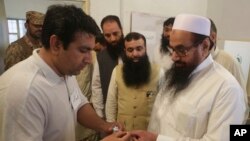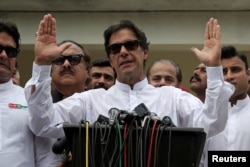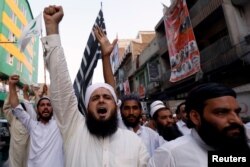Many in Pakistan are concerned about strong performance of several extremist religious parties with links to terror groups in recent elections and those groups' emergence in the country's political arena.
Pakistan just came out of its general elections in which Tehreek-e-Insaf (PTI), the party of former national cricket team captain Imran Khan, defeated the country's main two political parties.
While political analysts are still sorting through how PTI's win changes the political landscape, there is already concern over the strong performance of several extremist religious parties, some of which have links to terror groups.
Tehreek-e-Labbaik Pakistan (TLP) is one of the parties that quickly became a political force in Pakistan despite being just a year old. The party fielded over 180 candidates across the country, winning two million votes, and securing two seats in the Sindh provincial assembly.
TLP was created last August by a cleric who embraces Pakistan's hard-line blasphemy laws. The party champions the legacy of Mumtaz Qadri, a former bodyguard who was executed last year for killing the politician he was supposed to be protecting. Qadri said he killed Punjab Governor Salman Taseer in 2011 because the politician had called for the government to amend the blasphemy law.
Religious parties joining mainstream politics is not a new phenomenon in Pakistan. Many have had a long history in the country's political arena. And TLP did not win any seats in the national assembly despite its overall stronger than expected showing.
Party emergence 'alarming'
But analysts worry that TLP's success and the growth of even harder-line parties backed by militant groups with proven terror ties, is a dangerous sign for Pakistan's politics.
"This new religious order is very dangerous for Pakistan and for the population as well. It shows this TLP strategy is both active and passive," said Noreen Naseer, a political scientist from Peshawar University. "We see how they have used their street power. We have seen that in the past how TLP was maneuvering or communicating whatever they wanted to the government and different powerful institutions."
Naseer was referring to last year's Islamabad protest when thousands of TLP followers gathered in the country's capital and paralyzed the city for several weeks before the military intervened and persuaded the group to end its sit-in.
WATCH: Pakistani Extremist Party's Election Performance Generates Concern
At the time, TLP accused the government of committing blasphemy over attempting to modify a parliamentary bill related to the Khatam-e-Nabbuwwat oath, which affirms the end of prophecy with Muhammad being the last prophet. According to the existing law, every Muslim serving in the government in Pakistan has to take the oath.
Critics charge the oath has been used to persecute minority groups, such as the Ahmadi religious minority, which considers itself an adherent of Islam but does not believe in the end of prophecy.
TLP followers blocked lawmakers' efforts to amend the law.
Peshawar-based analyst Khadim Hussain said these "sectarian political parties will actually try to blackmail the mainstream political parties for laws or amendments in laws of their own choice. It will take the whole society or the state more towards radical or extremist views."
"These parties," he added, "were given a leeway during these elections to take forward their sectarian narrative and permeate it in the streets, villages, far-flung areas they [TLP] could not previously access."
Links to militants
Milli Muslim League (MML), is another political party that participated in the recent elections but did not garner enough votes to win a seat in national or provincial legislatures. It is directly linked to Hafiz Saeed, a U.S.-designated global terrorist and founder of the Lashkar-e-Taiba (LeT) terror group, and was designated a terrorist organization by the U.S. State Department earlier this year.
Saeed is believed to be the mastermind of the 2008 Mumbai terror attacks that killed more than 160 people, including six Americans.
MML fielded more than 260 candidates in provincial and state elections under the platform of Allah-O-Akbar Tehreek (AAT), an old Islamist political party with Saeed openly campaigning for them.
Similarly, Ahle-Sunnat-Wal-Jamaat (ASWJ), a sectarian Sunni militant group with links to terror groups Lashkar-e-Jhangvi (LeT) and al-Qaida, fielded several candidates in the elections.
VOA's Deewa service contributed to this report.
















